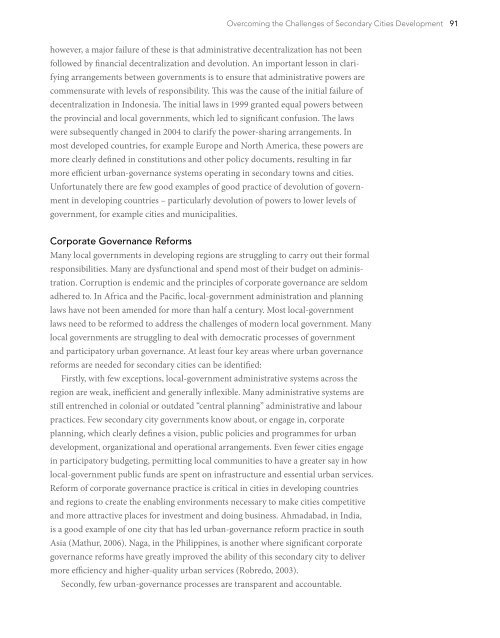DYhWN
DYhWN
DYhWN
Create successful ePaper yourself
Turn your PDF publications into a flip-book with our unique Google optimized e-Paper software.
Overcoming the Challenges of Secondary Cities Development 91however, a major failure of these is that administrative decentralization has not beenfollowed by financial decentralization and devolution. An important lesson in clarifyingarrangements between governments is to ensure that administrative powers arecommensurate with levels of responsibility. This was the cause of the initial failure ofdecentralization in Indonesia. The initial laws in 1999 granted equal powers betweenthe provincial and local governments, which led to significant confusion. The lawswere subsequently changed in 2004 to clarify the power-sharing arrangements. Inmost developed countries, for example Europe and North America, these powers aremore clearly defined in constitutions and other policy documents, resulting in farmore efficient urban-governance systems operating in secondary towns and cities.Unfortunately there are few good examples of good practice of devolution of governmentin developing countries – particularly devolution of powers to lower levels ofgovernment, for example cities and municipalities.Corporate Governance ReformsMany local governments in developing regions are struggling to carry out their formalresponsibilities. Many are dysfunctional and spend most of their budget on administration.Corruption is endemic and the principles of corporate governance are seldomadhered to. In Africa and the Pacific, local-government administration and planninglaws have not been amended for more than half a century. Most local-governmentlaws need to be reformed to address the challenges of modern local government. Manylocal governments are struggling to deal with democratic processes of governmentand participatory urban governance. At least four key areas where urban governancereforms are needed for secondary cities can be identified:Firstly, with few exceptions, local-government administrative systems across theregion are weak, inefficient and generally inflexible. Many administrative systems arestill entrenched in colonial or outdated “central planning” administrative and labourpractices. Few secondary city governments know about, or engage in, corporateplanning, which clearly defines a vision, public policies and programmes for urbandevelopment, organizational and operational arrangements. Even fewer cities engagein participatory budgeting, permitting local communities to have a greater say in howlocal-government public funds are spent on infrastructure and essential urban services.Reform of corporate governance practice is critical in cities in developing countriesand regions to create the enabling environments necessary to make cities competitiveand more attractive places for investment and doing business. Ahmadabad, in India,is a good example of one city that has led urban-governance reform practice in southAsia (Mathur, 2006). Naga, in the Philippines, is another where significant corporategovernance reforms have greatly improved the ability of this secondary city to delivermore efficiency and higher-quality urban services (Robredo, 2003).Secondly, few urban-governance processes are transparent and accountable.


